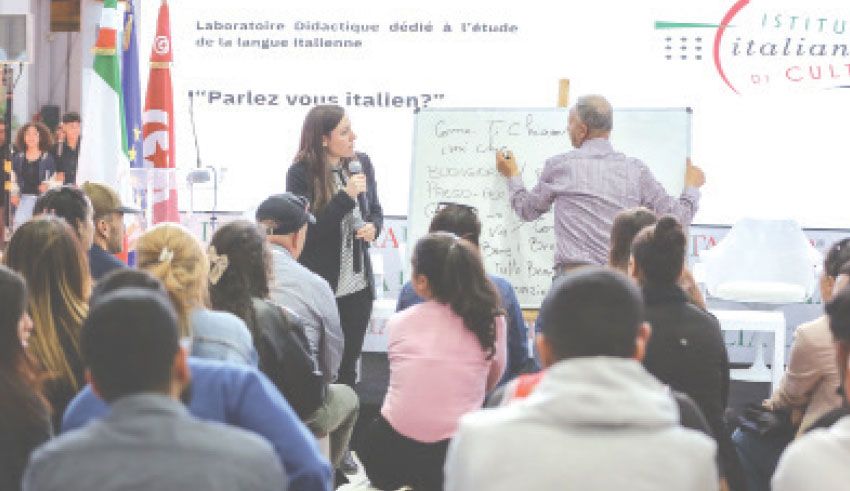In a meeting entitled “Letters from Europe” and dedicated to youth, the Italy meetings made a stopover yesterday morning, Thursday, April 25, in the fabulous world of illustration with the Italian engraver and illustrator Tiziana Romanin who took the audience on a trip to France where she settled and established a collaboration of more than 20 years with the French author Didier Levy.
One of these collaborations is the book Franz, Dora, the little girl and her doll that the illustrator took care to present at the Italian pavilion to explain through a few sketches of drawings which constitute a sort of “behind the scenes” of all the research and theatricalization work which is being woven before the book on the The very real story of Franz Kafka and his fiancée Dora is in the hands of young readers.
For Tiziana Romanin, who identifies as European first, then Italian, the illustration is a kind of correspondence between the two countries. This passion which was nourished in the genes – since her father was a topographer – developed in Venice where she did her higher studies in fine arts, before flying to Paris. Inspired indirectly by the Art of Venice and the warm colors of this city, she takes them on a journey through her illustrations to the country where gray prevails.
Indeed, she clarified, illustration is a long work and a meticulous process of research that is carried out. For the case of a true story like that of Franz and Dora, it was necessary to dig into many essential details: the setting of Berlin in the 1920s, the light of a monochrome city, the period costumes, etc. hence the importance of the choice of the palette of primary colors because the illustration, although it is imagined, is a division of the text which is done gradually while reading a book whose illustration is important in telling a story in History.
Anti-digital, the illustrator, who has more than 20 children’s books to her credit, remains faithful to manual work because nothing beats touch and smell in this profession to deliver, thanks to colored pencils and watercolor, a book that can amaze the child, the most difficult of readers and the most sincere, she says. Illustration, she concludes, is a profession that is developing and which requires a general culture of reference in literature, history, theater, and which is based above all on reading.
Silvia Finzi talks about Italian printing and publishing in Tunisia
Silvia Finzi, Italianist and historian renowned in Tunisia, professor at the Faculty of Letters and Human Sciences at the University of La Manouba in Tunis, specializing in the history of Italian emigration to Tunisia, was one of the guests of note of the pavilion of Italy, guest of honor of the 38e edition of the Tunis International Book Fair.
During his meeting which took place on Wednesday April 24, 2024 at the Italy pavilion, focused on the history of Italian newspapers in Tunisia, including the best known and oldest He Corriethe first periodical printed in the Italian language published in 1838, currently taking the form of Corriere di Tunisifor regular publication, and which remains the only Italian-language newspaper that continues in the Maghreb, Silvia Fenzi, director of the magazine Il Corriere di Tunisilooks back on nearly two centuries of history of Italian printing and publishing in Tunisia.
In this fairly diverse media landscape, politically oriented newspapers have emerged including The voice of the worker taking the colors of independent socialism or even He rose who stood against the Italian authority of that time.
With a fairly diverse and complex panorama, part of the memory of Italian publishing is in fact preserved in the Tipografia Fenzi printing house, founded in 1928 on Rue de Russia and which constitutes the first Italian printing house in Tunisia.
There are more than 120 publications in the Italian language printed in Tunisia between the 19the and the XXe century which testify to a deep bond between Italians and Tunisians, where the two communities and the two countries intertwine in important pages of their history and which illustrate the close cultural links between Italy and Tunisia.

Do you speak Italian ?
In addition to meetings dedicated to a range of expressive forms to strengthen dialogue in the publishing sector, by creating direct synergies between Italian and Tunisian authors and publishers, the objective of the Italian cultural program within the framework of the 38e edition of the Tunis International Book Fair is also to introduce more people to the Italian language chosen by more than 40,000 students in Tunisian high schools.
To this end, a didactic exchange dedicated to the study of the Italian language and entitled “Do you speak Italian?” was organized on the afternoon of Tuesday April 23, 2024 for the benefit of a large number of curious and informed people. A majority adult audience, men and women, interacted with the Italian language teacher by offering them in entertainment and fun in almost an hour an initiation to the ABC of Italian, a way of bringing the audience closer to one of the most widely taught languages in the world and one of the most popular foreign languages in Tunisia.
A large part of the audience welcomed this initiative to make this beautiful language which is so close and so familiar to us as Italian and which encourages people to learn how to get used to reading in Italian.
It should be noted that the official Italian presence at the 2024 edition is coordinated by the Italian Embassy in Tunis, in collaboration with ICE — Agency for the Promotion Abroad and Internationalization of Italian Companies — Commercial Section of the embassy. Francesca Tango, director of the ICE Agency Office in Tunis, said: “ We therefore hope that this participation will be the opportunity for a fruitful exchange between the publishing houses of the two nations: even in Italy, despite the presence of large publishing groups like Mondadori, Gems, Giunti, Feltrinelli, the strength of small and medium publishing houses, counterparts of Tunisian publishers, is still as important “.








